
Indicator scoreboard
EMU - September seasonally adjusted industrial output dropped 0.5 percent and 0.6 percent when compared with last year. Output fell in most sectors, lead by durable consumer goods, down 2.9 percent, capital goods, down 1.0 percent, and intermediate goods, down 0.8 percent. Non-durable consumer goods rose 0.1 percent while energy goods rose 0.3 percent.
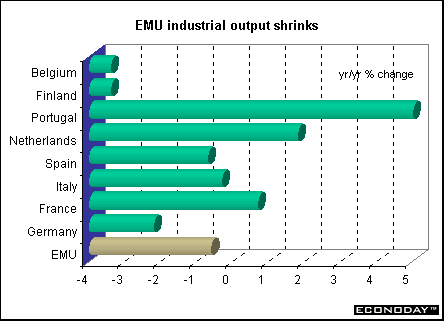
Germany - October Ifo Institute's west German business sentiment index declined to 84.7 from 85.0 in September. The decline was the third in a row. The decline pushed the west German business confidence index down to its lowest level since October 1993. While the Ifo business expectations index declined, current conditions rose the first time in nine months. Business expectations fell to 89.6 from 90.5 in September while current conditions rose to 79.9 from 79.6 the month before.
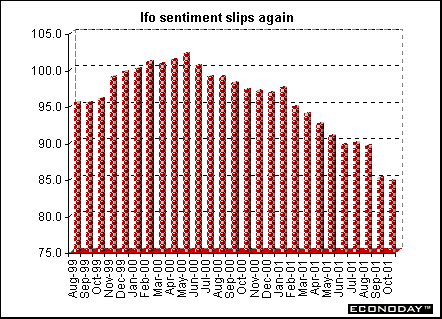
Third quarter real seasonally adjusted gross domestic product fell 0.1 percent after it stagnated in second quarter. When compared with last year, GDP rose 0.4 percent. All major categories declined except net exports. Domestic demand fell 1.3 percent, the largest drop in eight years. Private consumption fell 0.2 percent, after posting tax-cut induced gains of 0.8 percent in the second quarter and 1.2 percent in the first. Total investment activity dropped for the fourth quarter in a row, down 0.7 percent. Equipment investment fell another 1.8 percent after a 3.2 percent plunge in the second quarter, confirming that companies remain hesitant to invest due to the weak economic outlook.
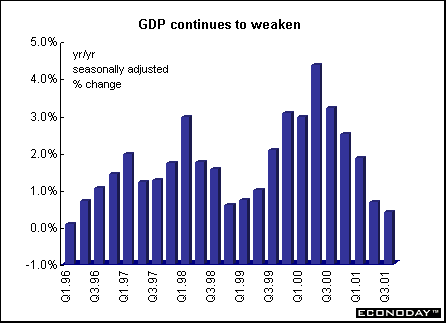
September import prices plunged 1.6 percent, the largest monthly decline since December 2000. Import prices plummeted 5.6 percent when compared with last year. Excluding oil products, import prices dropped 0.4 percent and 2.1 percent on the year. Export prices fell 0.3 percent and 0.8 percent on the year.
October seasonally adjusted producer prices fell 0.7 percent but were up 0.6 percent when compared with last year. Energy prices plunged 13.6 percent. Excluding oil product prices, the PPI was down 0.5 percent but up 1.5 percent on the year. Capital goods prices at the producer level rose 0.1 percent on the month but were up 1.2 percent on the year. Consumer goods PPI rose 0.1 percent and 2.6 percent on the year.
September seasonally adjusted construction orders fell 5.2 percent and 6.6 percent when compared with last year. West German total construction orders fell 3.5 percent and dropped 11.2 percent in east Germany.
France - Third quarter seasonally and workday adjusted gross domestic product rose 0.5 percent and 2 percent when compared with last year. Household and government spending offset a drop in inventories. Private consumption growth rebounded 1.2 percent as it recovered from an inflation induced slowdown of 0.3 percent in the second quarter. Government spending was also stronger, up 0.8 percent after a 0.6 percent gain in the second quarter. Business investment declined 0.2 percent after a 0.1 percent increase in the second quarter.
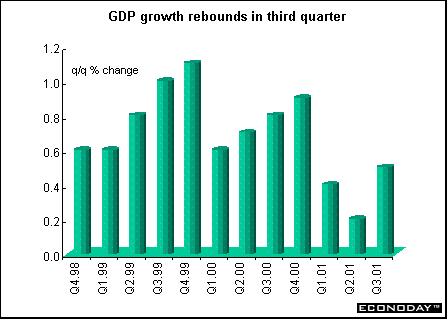
October seasonally and calendar adjusted consumer spending on manufactured goods fell 0.4 percent due to weaker clothing and general retail sales. When compared with last year, consumer spending on manufactured goods rose 3.0 percent. Sales of other manufactured goods, which include cosmetics, jewelry, photo and sporting goods and account for over 40 percent of total spending, fell 0.9 percent on the month but were up 1.9 percent on the year. Household durables jumped .5 percent after a decline of 0.5 percent in September. Auto sales rose 0.8 percent. Household spending excluding the auto sector and medical products was down 0.5 percent on the month and was only 0.9 percent higher on the year.
Italy - September industrial orders fell 10.0 percent when compared with last year. This was the biggest drop since June 1996. Domestic orders fell 8.4 percent while foreign orders sank 12.5 percent. Domestic orders account for around 62 percent of the overall index, with foreign orders making up some 37 percent. All ten product sectors declined.
Britain - October merchandise trade deficit with countries outside the EU narrowed to Stg1.717 billion, down from Stg1.755 billion in September. Imports rose 7.3 percent while exports climbed monthly 9.9 percent.
Third quarter gross domestic product was revised down to 0.5 percent from the provisional estimate of 0.6 percent. When compared with last year, growth was revised to 2.1 percent from the provisional estimate of 2.2 percent. Third quarter service sector grew at 0.6 percent, significantly below the 0.9 percent rate for the second quarter. Financial and business services rose by 0.4 percent on the quarter compared with 1.2 percent in the second quarter. Household expenditures were up 1.3 percent on the quarter and up 4.5 percent on the year. Gross fixed capital formation (investment) fell 3.1 percent on the quarter and was down 0.8 percent on a year earlier.
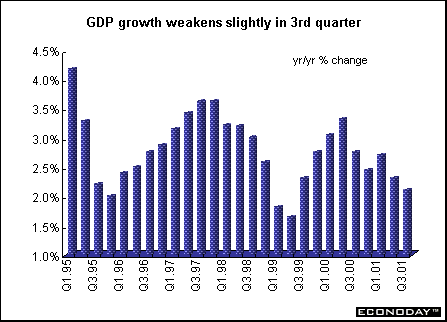
Belgium - October Belgian National Bank's industry sentiment index was minus 14.6 compared with minus 17 in September. This index remained at its lowest level in nearly three years. The dominant manufacturing component, widely seen as a leading cyclical indicator for the EMU, regained 4.1 points after a 5.7 point drop but continues to be at its lowest level in nearly three years.
Asia
Japan - September tertiary industry index, which tracks business at service providers, fell 0.9 percent. The index has fallen for three months, the longest decline since the fourth quarter of 1997. Third quarter tertiary index fell 1 percent from the second quarter. The all industry index, which adds factory production and government spending to the services index, fell 1.7 percent in the quarter.
October seasonally adjusted merchandise trade surplus narrowed to 379.8 billion yen ($3.1 billion) from a revised 713.6 billion yen surplus in September. From a year earlier, the surplus shrank to 462.5 billion yen. Export volumes fell for the 10th month, dropping 9.6 percent from a year earlier. Exports by value rose 1.1 percent from September. From a year earlier, they fell 9 percent, led by a drop in semiconductor parts and electronic office equipment. Import volumes dropped 2.6 percent from a year earlier, the third straight decline. Imports by value rose 11.9 percent rebounding from two straight declines. From a year earlier, they fell 4.7 percent.
Americas
Canada - September merchandise trade surplus rose to C$4.71 billion. Exports fell 1.7 percent, to their lowest level in 19 months. Imports sank 4.6 percent with all principal commodity groups but forestry declining. Imports have fallen in six of the first nine months of 2001. Import transactions show a marked decline after September 11, but there was a resumption to near normal levels by the end of that month. Merchandise exports to the United States declined 2.1 percent, with imports from the U.S. down 4.4 percent. The trade surplus with the U.S. rose to C$7.8 billion. Exports rose only in agriculture and fishing products, industrial goods and consumer goods. The largest decline, of 14.2 percent, was in energy products because of declining prices. Passenger car exports declined 4.1 percent, while exports of trucks and other motor vehicles fell 4.0 percent.
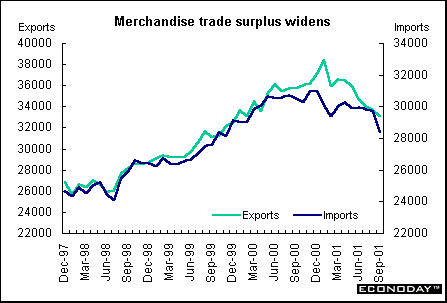
October unadjusted consumer price index was down 0.5 percent but was up 1.9 percent when compared with last year. The October decline mainly was due to weaker prices for gasoline. October seasonally adjusted CPI fell 0.3 percent but rose 2.1 percent when compared with last year. Seasonally adjusted CPI excluding food and energy was unchanged on the month but up 2.3 percent on the year.
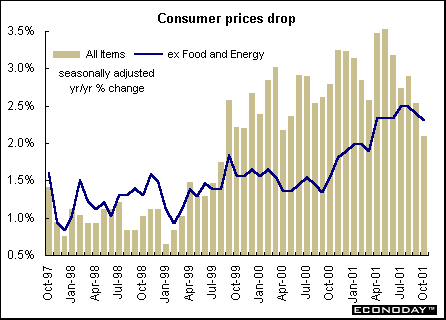
September retail sales dropped 1.7 percent after remaining unchanged in August. This was the largest monthly decline in sales since January 1998, when an ice storm disrupted retail sales in parts of Central and Eastern Canada. The decline is partly related to the events of September 11. In constant dollars, retail sales tumbled 2.3 percent in September, after remaining flat in the previous five months.
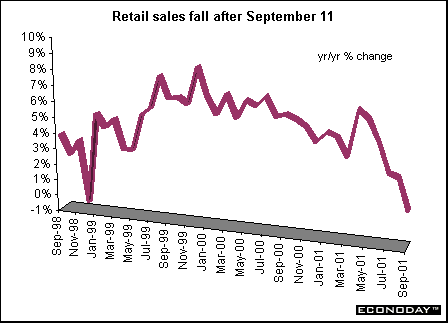


Introduction • Global
Stock Market Indexes • Recap of Global Markets
• Currencies • Indicator
Scoreboard

The Bottom Line •
Looking Ahead
|